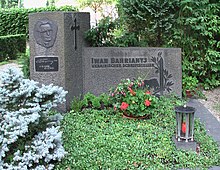Ivan Bahrianyi
He could not receive education consistently due to difficult living conditions during First World War, the revolution, and the post-war chaos.Bahrianyi entered the Kyiv Art Institute but did not graduate due to material distress and the prejudiced attitude of the management.They called him Mazepian (a Russian derogatory term for Ukrainians after Ivan Mazepa, similar to modern Banderites), which may have been one of the reasons for his joining the OUN in the future.[citation needed] During the Civil War and later, in the early 1920s, he was involved in Soviet social and political work, but in 1925 he left Komsomol.After Okhtyrka was overrun by the German army at the onset of World War II, Bahrianyi joined the Ukrainian nationalist underground organization and later relocated to Galicia.He headed the Ukrainian National Council's executive committee and also performed the duties of the Deputy President of the UNR in exile.In 1963 the Democratic Union of Ukrainian Youth based in Chicago started action to support awarding Ivan Bahrianyi with the Nobel Prize.In 1992, Ivan Bahrianyi posthumously received the national Shevchenko Prize (Ukrainian: Шевченківська премія) for his novels Tyhrolovy and Sad Hetsymanskyi.

Kharkiv GovernorateRussian EmpireNeu-UlmBavariaWest GermanyUkrainianessayistnovelistpoliticianShevchenko prizerevolutionOkhtyrkathe BolsheviksUkrainian People's RepublicDonbasCrimeaIvan MazepaBanderitesKomsomolValerian PidmohylnyYevhen PluzhnykBorys Antonenko-DavydovychSoviet authoritieshistorical novelthe OGPUforced labor campBamlagThe Tiger TrappersMary BeckGaliciaUkrainian Supreme Liberation CouncilTiger TrappersHuliaipoleOstarbeiterUkrainian Revolutionary Democratic PartyNeu UlmThe Hunters and the HuntedWhy I am not going back to the Soviet UnionTernopilPushkinKharkivUkrayinska PravdaWayback MachineShevchenko National PrizeUkrainian Bandurist ChorusHryhory KytastyVolodymyr KolesnykIhor KalynetsRoman LubkivskyPavlo Movchan